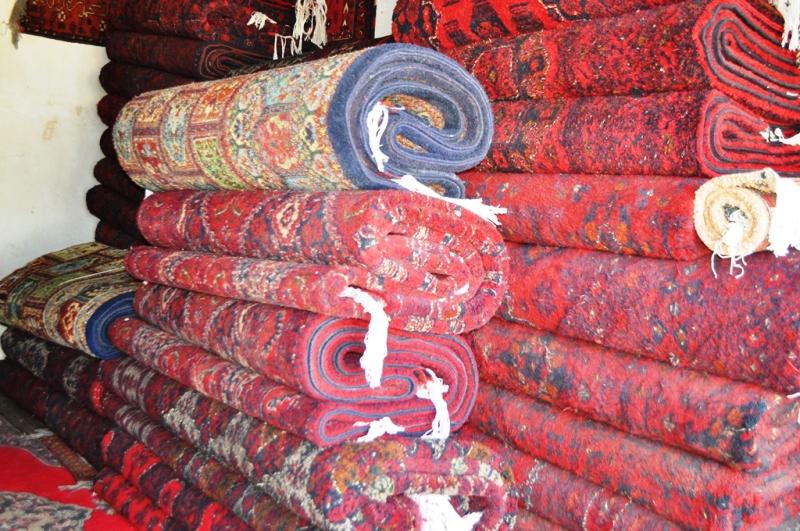MAIMANA (Pajhwok): Carpet weavers and investors in northern Faryab province expressed grave concern over a sharp 40 per cent decline in the industry, alleging that lack of market for their products had been a major reason for the decline.
They also complained that imitation of the Afghan carpet designs in the international market and availability of cheap carpets in domestic bazaars are other reasons for the industry to demonstrate downward trend.
Faryab is the world’s exports are produced in Andkhoy district where majority of the residents are busy weaving carpets.
Afghan carpets have a growing demand because of being woven with hands while majority of carpets in the world are manufactured through machine.
The carpet weavers urged the government to extend support to this ancient and indigenous industry and lower the taxes on raw materials.
Abdul Nazar, a carpet seller in Andkhoy, told Pajhwok Afghan News the government did not pay heed to resolve problems of the carpet industry. He complained Afghan products were sold as Pakistani products in the world market.
Earlier, he added, Afghan carpets were exported to the world market via Turkey but the country has raised its taxes, creating troubles for Afghan traders.
Nazar said exports of Andkhoy carpets have decreased by 40 per cent. “Earlier we were selling one carpet up to $1,000 now it was being sold at around $600.”
He expressed concerns that Afghan carpets were exported to Pakistan and then to western countries with Pakistani brand.
According to Nazar, the carpet weavers have submitted their complaints to the government many times to curb the import of less-quality raw material, but the government has not paid any attention to their demands.
Khudaiwal, another carpet seller in Andkhoy said, more than 90 per cent of the residents’ income came from carpet weaving, but in the last one year some 70 per cent of the people have left this profession.
“Earlier, I was selling three to four carpets per day, but now I can’t sell four carpets in four months,” he added.
A major reason in decline of these sells, he said, was the import of low-quality and low-price carpets from Iran, Turkey and Pakistan.
According to Khudaiwal, lack of security, prolong elections, and overall economic situation of the country were among other reasons for the decline of the vital industry.
Abdul Saleh, carpet weaver in Qurghan district, said four members of his family were weaving carpet in order to make ends meet. He faced many problems and was thinking of changing profession.
The Afghanistan Investment Support Agency (AISA), however, said the sales of Afghan carpets have declined in the last five years.
Sayed Zabihullah, AISA official in Andkhoy, said: “The designs of Afghan carpets are being imitated in countries like Pakistan, Iran, and Turkey.”
Such carpets, he said, was imported back to Afghanistan and was sold with low price.
Mohammad Rahim Misgar, Chamber of Commerce and Industries (AICC) head in Andkhoy, said despite a tax hike of 16 to 35 per cent on foreign carpets, people still were unable to buy Afghan carpets.
The most famous carpets produced in Faryab are Mawry, Resh-e-Abrishomi and Ali Khwaja which have great demands in the world market.
Karima Baihaqi, director labour and social affairs department, said 50 per cent of the residents in Maimana were unemployed while the figures were even higher in districts.
Majority of non-governmental organizations that were active in the province have ended their projects. “Because of insecurity and political situation majority of these NGOs have stopped working,” she added.
She urged the government to pay utmost attention to the carpet industry and agriculture since these two fields were vital for the people.
Meanwhile, the workers’ national union has said that only three million people in Afghanistan were employed while 13 million others remained unemployed.
But the Ministry of Social and Labour said the figures were inaccurate and the number of unemployed in the country was four million people.
Khan Jan Alkozai, deputy head of ACCI, told Pajhwok Afghan News the worth of carpet to Afghan economy was as important as red gold but government’s negligence, bureaucracy, and graft has slowed the industry’s development.
He added despite billions of dollars poured in to Afghanistan in the last 14 years no industrial park was built and no proper plans to uplift this industry were made.
“One of the major hurdles in the way of our carpet industry is that the payment for the carpet weavers have declined and they are leaving the industry in search of other jobs,” he added.
It is pertinent to mention that last year Afghanistan’s carpet was awarded an international award for the second time in Germany for best carpet.
hg/rm







GET IN TOUCH
NEWSLETTER
SUGGEST A STORY
PAJHWOK MOBILE APP